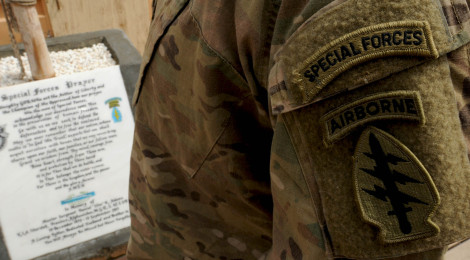V/R
Dave

UNCONVENTIONAL WARFARE DOES NOT BELONG TO SPECIAL FORCES
August 12, 2013 · by David Maxwell · in Commentary and Analysis
“US Army Special Forces is the only force in the Department of Defense organized, trained, equipped, educated, and optimized for the conduct of unconventional warfare.”
I have written those words many times in the past thirty plus years of my military service. With those words I have implied that the unconventional warfare mission belongs solely to US Army Special Forces (SF). I was wrong.
I began to realize this in 2009, when I participated in a working group established by the US Army John F. Kennedy Special Warfare Center and School to re-examine the definition of unconventional warfare. The revised definition that resulted was a compromise that did not satisfy everyone in the Special Forces (SF) or wider Special Operations Forces (SOF) community. Nonetheless, the definition currently resides in Joint Publication 1-02 the Department of Defense Dictionary of Military and Associated Terms and is now the foundation for US military unconventional warfare doctrine: Unconventional warfare consists of“activities to enable a resistance or insurgency to coerce, disrupt or overthrow a government or occupying power through and with an underground, auxiliary, and guerrilla force in a denied area.”
The working group sought to develop a more universal definition, one that would describe the intent and methodology of an unconventional warfare (UW) strategy that would not be exclusive to the United States but rather, would also be able to describe UW from an enemy point of view (As I have argued recently, we should not be concerned with Al Qaeda and terrorism in the way that we have been since 9-11; instead we must focus on the unconventional warfare strategy that al-Qaeda is executing against the United States, the West and selected nations in the Middle East).
It is clear that UW cannot “belong” solely to one military force, nor even to the military alone. It is a strategic mission that is an offensive option for policymakers and strategists. In the United States the UW mission is in fact an interagency one at the strategic level that can be shared between the Central Intelligence Agency and the military. Nowhere has this been better exemplified than in Afghanistan in 2001, where the mission combined the resources, human contacts, and authorities of the CIA with the capability, capacity, and expertise of the SF, to mount a very effective UW campaign. The CIA and SOF in general have learned (or re-learned, if we look back to the OSS in WWII and later in Vietnam and Laos, as well as programs such as the Civilian Irregular Defense Group or Operation White Star) to work together in what some of our senior leaders term “shared battle-space.”
However, tactical and operational cooperation and collaboration is not enough. Often, strategic-level analysis and decision making that is critical for UW is stifled because of the widely held belief that UW belongs solely to SOF, and in particular to SF. SF is organized, trained, equipped, educated and optimized for a particular aspect of UW: to work “through and with an underground, auxiliary and guerrilla force in a denied area.” Beyond that, the decision, the strategy, and the campaign plan to enable a resistance or guerrilla force to coerce, disrupt or overthrow a government or occupying power is made at the strategic level at what we once called the National Command Authority – this is outside the sole purview of SOF and SF.
Due to the prevailing wisdom that SF owns the UW mission, many senior decision makers, policymakers and strategists both inside the Beltway and at the Geographic Combatant Commands (GCC) rarely consider the strategic option of conducting UW. Furthermore, as evidenced by our myopic view of terrorism, we do not fully comprehend that our enemies are, in fact, conducting unconventional warfare. As a result, we do not consider potential strategies to conduct “counter-unconventional warfare,” instead focusing solely on the means and methods of counterterrorism.
Our problem is with the nature of special operations itself. Until recent years in the post 9-11 world, SOF has been associated with secrecy and compartmentalization. These are critically important requirements for special operations. But the fact remains that, notwithstanding the notoriety of highly visible missions such as the Bin Laden raid, years of paying little attention to SOF has led to a situation in which SOF activities and missions are not well understood, accepted, or sought after.
(Continued at the link below)
No comments:
Post a Comment